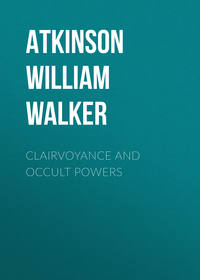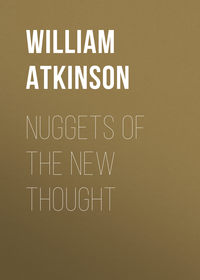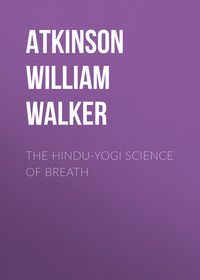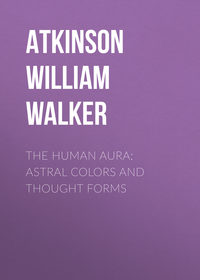
Mystic Christianity; Or, The Inner Teachings of the Master
Jesus exists today, as the Christ Principle which actually lives and acts, but which is not confined in a body of any kind, using the word "body" in its accustomed sense. As the Christ Principle or "The Christ" He is mingled with the life of the human race, and may be found immanent in the mind of every man, woman and child that has ever existed, does now exist, or will exist so long as Man is Man. Not only is this true of those who have lived since His passage from the physical body, but it is equally true of those who lived before His birth. This apparently paradoxical statement may be understood when we remember that these souls did not "die," but only "passed on" to the Astral Plane, from whence they re-incarnated in due time. The Christ (for so we shall speak of the present-state of Jesus) even entered into, and still abides in, the Astral Plane, as well as upon the Material Plane, for wherever the souls of men abide—or whatever place their residence may be—there is found The Christ, ever working for the salvation and redemption of the race.
On the Astral Plane He is working in the minds of the souls abiding there, urging them to cast off the dross of earth-desires and to fix the aim upon higher things, to the end that their re-incarnations may be under improved conditions. On the Physical Plane He is working in the hearts and minds of the earth-people, striving ever to uplift to higher things. His aim is ever toward the liberation of the Spirit from its material bonds—the Realization of the Real Self. And so, in the hearts of all men, Christ is living, suffering, and being crucified every day, and this must continue until Man is redeemed and saved, even the last man.
This wonderful sacrifice of Christ far surpasses the physical sacrifice of Jesus, the man. Try to imagine, if you can, even the faintest pangs of a being so exalted compelled to dwell in the world of the hearts and minds of a humanity so steeped in materiality as our race, knowing always the possibilities of the souls if they would but reach upward to higher things, and yet constantly suffering the knowledge of the base, carnal, material thoughts and acts flowing from these souls. Is not this the extreme refinement of torture? Does not the agony of the cross sink into insignificance beside such spiritual agony? You rail at the cruelty of the Jews who crucified their Savior, and yet you crucify your Savior, with a thousandfold degree of torture, every day of your life, by your persistence in the carnalities and foolishness of mortal thought and action.
The mighty uplift of the world since the death of Jesus, of which the present is but a faint prophecy of the future, has been due largely to the energizing influence of The Christ in the hearts and minds of the race. The sense of the Fatherhood of God and the Brotherhood of Man, which is now manifesting so powerfully in the world of Men, is but an instance of the work of the Christ—the Savior and Redeemer. And the highest dreams of the exalted souls of this generation are but inadequate visions of what the future will hold for the race. The work is just beginning to bud—the blossom and the fruit will render this earth a far more glorious place than even the highest ideals of heaven entertained by the faithful in the past. But even these things of the future will be poor things, when compared with the life of the higher planes which await the race when it has demonstrated its fitness to pass on and on and on to these greater glories. And ever and ever The Christ is working, and toiling and striving and suffering, in His efforts to raise humanity even one petty degree in the spiritual scale of being.
The Christ is always with us, and if we but recognize His presence we shall be able to feel that warm, loving response to our soul-hunger and spiritual thirst which will result in our being given that we are so longingly craving. Here within us dwells The Christ, ever responding to the cry of Faith, "Believe in Me and ye shall be saved." What a promise this is seen to be when properly understood! What a source of power and comfort is opened up to every human soul when the Inner Truth underlying the teachings is understood! Mystic Christianity brings this Message of Truth to each and all of you who read these lines. Will you accept it?
We would ask our students to pause at this point and contrast the teachings of Mystic Christianity regarding the doctrine of Christ, the Savior, with the corresponding teachings of the current Orthodox Theology.
On the one hand we have Jesus the God-Man deliberately choosing the work of the World Redemption and Salvation, and descending into the circle of the World-Karma, relinquishing the privilege of His Godhood and taking upon Himself the penalties of Manhood; not only undergoing the sufferings of the physical man, but also binding Himself upon the Cross of Humanity for ages, that by His spiritual presence in and of the race He might lift up humanity to godhood.
On the other hand, we have a picture of an angry Deity, manifesting purely human emotion and temper, bent on revenging himself upon the race which he had created, and demanding its eternal punishment in hell-fire; then the same Deity creating a Son whom he sent into the world, that this Son might be the victim of a blood-atonement and death upon the cross, that the Deity's wrath might be appeased and the blood of this Divine Lamb be accepted to wash out the sins of the world.
Can you not see which is The Truth and which is the perversion? The one is from the pure fountain of Spiritual knowledge—the other originated in the minds of ignorant theologians who were unable to grasp and understand the Mystic teachings, but who built up a system of theology in accordance with their own undeveloped minds; making a God who was but a reflection of their own cruel animal natures, demanding, as did they themselves, blood and pain—physical torture and death—in order to appease a most un-Divine wrath and vengeance. Which of the two conceptions seems most in accord with the intuitive promptings of the Something Within? Which brings the greater approval from The Christ within your heart?
THE CHRISTIAN CREED
There are three creeds recognized by the Christian Church—the Apostles' Creed, the Nicene Creed, and the Athanasian Creed. Of these, the first two are commonly used, the third being not so well known and being seldom used.
The Apostles' Creed, which is the most commonly used, is believed (in its present form) to be of later origin than the Nicene Creed, and many authorities believe it to be a corrupted rendering of the original declaration of faith of the Early Christians. It is as follows:
"I believe in God the Father Almighty, Maker of heaven and earth; and in Jesus Christ his only Son our Lord, who was conceived by the Holy Ghost, born of the Virgin Mary, suffered under Pontius Pilate, was crucified, dead and buried; he descended into hell; the third day he arose again from the dead; he ascended into heaven, and sitteth on the right hand of God the Father Almighty; from thence he shall come to judge the quick and the dead. I believe in the Holy Ghost, the holy Catholic Church, the communion of saints, the forgiveness of sins, the resurrection of the body, and the life everlasting."
The Nicene Creed was drawn up and adopted by the Council of Nice in the year A.D. 325. As originally adopted it ended with the words "I believe in the Holy Ghost," the present concluding clauses being added by the Council of Constantinople in A.D. 381, excepting the words "and the Son," which were inserted by the Council of Toledo, A.D. 589. It is as follows:
"I believe in one God, the Father, Almighty, Maker of Heaven and earth, and all things visible and invisible; and in one Lord Jesus Christ, the only-begotten Son of God, begotten of his Father before all worlds, God of God, Light of Light, very God of very God, begotten, not made, being of one substance with the Father, by whom all things were made; who for us men and for our salvation came down from heaven and was incarnate by the Holy Ghost of the Virgin Mary, and was made man, and was crucified also for us under Pontius Pilate; he suffered and was buried and the third day he rose again according to the scriptures and ascended into heaven, and sitteth on the right hand of the Father; and he shall come again with glory to judge both the quick and the dead, whose kingdom shall have no end. And I believe in the Holy Ghost, the Lord and Giver of Life, who proceedeth from the Father and the Son, who with the Father and Son is worshipped and glorified, who spoke by the prophets; and I believe in one catholic and apostolic church; I acknowledge one baptism for the remission of sins, and I look for the resurrection of the dead and the life of the world to come."
Let us now briefly examine the principal statements of these creeds, which were compiled centuries after Jesus' death, viewing them by the light of Mystic Christianity.
"I believe in one God, the Father Almighty, Maker of heaven and earth, and all things visible and invisible."—(Nicene Creed.)
The form of the above fundamental principle of Christian belief is taken from the Nicene Creed, which is somewhat fuller than the similar declaration in the Apostles' Creed. It requires no comment. It is a statement of belief in a One Creative Power, from which all things have proceeded. There is no attempt made to "explain" the nature of the Absolute, or to endow it with any of the human attributes which theologians have delighted in bestowing upon the One. It merely asserts a belief in the existence of One Supreme Being—which is all that is possible to man—all else is ignorant impertinence.
"And in Jesus Christ his only Son our Lord, who was conceived by the Holy Ghost."—(Apostles' Creed.)
"And in one Lord Jesus Christ, the only begotten Son of God, begotten of his Father before all worlds, God of God, Light of Light, very God of very God, begotten, not made, being of one substance with the Father."—(Nicene Creed.)
In this declaration, the belief in the Divinity of Jesus is made. The Apostles' Creed shows the cruder conception, rather inclining toward the perverted idea of the conception of the Virgin by the aid of the Holy Ghost, similar to the origin of the hero-gods of the different religions in which the father was one of the gods and the mother a woman. But the Nicene creed gives at least a strong hint of the mystic teachings. It speaks of Him as "begotten of his Father"—"begotten, not made." The expressions, "God of God; Light of Light; very God of very God," show the idea of identical spiritual substance in the Spirit. And then the remarkable expression, "being of one substance with the Father," shows a wonderful understanding of the Mystery of The Christ. For, as the mystic teachings show, Jesus was a pure Spirit, free from the entangling desires and clogging Karma of the world. Identical in substance with the Father. "The Father and I are one," as He said. Is there anything in the Orthodox Theology that throws such light on this subject as is shed by Mystic Christianity's teaching regarding the nature of the soul of Jesus?
"Born of the Virgin Mary."—(Apostles' Creed.)
"Who for us men and for our salvation came down from heaven, and was incarnate by the Holy Ghost of the Virgin Mary, and was made man."—(Nicene Creed.)
The Nicene Creed here gives a surprisingly clear statement of the Mystic teachings. "Who for us men and our salvation came down from heaven" shows the purpose of the incarnation. "Came down from heaven" shows pre-existence in the bosom of the Absolute. "And was incarnate" shows the descent of the Spirit into the flesh in the womb of Mary. "And was made man" shows the taking on of the physical body of the infant in the womb. Does not the Mystic teaching give a clearer light on this statement of the Creed?
"Was crucified, dead and buried; he descended into hell; the third day he rose again from the dead."—(Apostles' Creed.)
"He suffered and was buried, and the third day he rose again according to the scriptures, and sitteth on the right hand of the Father."—(Nicene Creed.)
The "descent into hell" of the Apostles' Creed of course meant the passing to the place of disembodied souls—the lower Astral Plane. Even the orthodox teachers do not now pretend that the term "hell" meant the place of torture presided over by the Devil, which theology has invented to frighten people into the churches. "The third day he arose from the dead" (and the corresponding passage in the Nicene Creed) refers to the appearance in the Astral Body—the return from the Astral Plane in which He had sojourned for the three days following the crucifixion. "And ascended into heaven"—this passage shows the belief that He returned to the place from which He came, for the Nicene Creed has stated that he "came down from heaven and was incarnate … and was made man."
The passage in both creeds stating that He then took his place "on the right hand of the Father" is intended to show that He took the place of the highest honor in the gift of the Father. The mystic teachings explain this by showing that The Christ is separated from The Father by but the most ethereal intervening of spiritual substance, and that He is a Cosmic Principle second in importance only to the Father. Truly this is the place of honor on "the right hand of the Father."
"He shall come to fudge the quick and the dead."
In this passage we see the intimation that not only with the "quick" or living people is The Christ concerned, but also with the "dead," that is, with those who "passed out" before and after His time and who have passed on to the Astral World, as we have explained in this lesson. Whether or not the framers of the Creed so understood it—whether or not they were deluded by the tradition of the "Day of Judgment"—certainly the Early Christians, or rather, the mystics among them, understood the teachings as we have given them and spoke of Him as "living in the dead as well as in the living," as one of the occult records expresses it.
"The communion of saints" is the spiritual understanding of the Mysteries by the Illumined Ones. "The forgiveness of sins" is the overcoming of the carnal mind and desires. "The resurrection of the dead and the life of the world to come" is the promise of life beyond the grave, and not the crude idea of the physical resurrection of the body, which has crept into the Apostles' Creed, evidently having been inserted at a later date in order to bolster up the pet theories of a school of theologians. Note that the Nicene Creed says merely "the dead" and not "the body." The version of the teachings preserved by the Mystics has a corresponding passage, "And we know the truth of the deathlessness of the soul." (The italics are ours.)
The consideration of remaining passages in the creeds, relating to the existence of the "Holy Ghost," must be deferred until our next lesson.
THE TENTH LESSON
THE SECRET DOCTRINE
The concluding statement of the Creeds (brought over from the preceding lesson) refers to the Holy Ghost.
"I believe in the Holy Ghost." (Apostles' Creed.)
"And I believe in the Holy Ghost, the Lord and giver of life." (Nicene Creed.)
To the average Christian the nature of the Holy Ghost—one of the beings of the Trinity—is veiled in obscurity, and is generally pronounced "not to be understood." A careful examination of the orthodox Christian writings will show the student that the Church is very much at sea regarding this subject, which should be of the greatest importance to its priests and congregations. Ask the average intelligent churchman regarding the nature of the Holy Ghost, and see for yourself the vague, contradictory and unsatisfactory concepts held by the person questioned. Then turn to the encyclopaedias and other books of reference, and see how little is known or taught regarding this important subject.
It is only when the teachings of Mystic Christianity are consulted that one receives any light on the subject. The Occult Teachings are quite explicit on this subject so fraught with difficulty and lack of comprehension on the part of the orthodox teachers and students.
The teaching of Mystic Christianity, regarding the Holy Ghost, may be
summed up by the great general statement that: The Holy Ghost is the Absolute in its phase of Manifestation, as compared to its phase of Unmanifestation—Manifest Being as compared with Unmanifest Being—God Create as compared with God Uncreate—God acting as the Creative Principle as compared to God as The Absolute Being.
The student is asked to read over the above general statement a number of times and to concentrate his or her attention carefully upon it, before proceeding further with the lesson.
To understand the above statement it is necessary for the student to remember that the Absolute may be thought of as existing in two phases. Not as two persons or beings, remember, but as in two phases. There is but One Being—there can be but One—but we may think of that One as existing in two phases. One of these phases is Being Unmanifest; the other, Being Manifest.
Being Unmanifest is the One in its phase of Absolute Being, undifferentiated, unmanifested, uncreated; without attributes, qualities, or natures.
It is impossible for the human mind to grasp the above concept of Being Manifest in the sense of being able to think of it as a "Thing, or Something." This because of the essential being of it. If it were like anything that we can think of, it would not be the Absolute, nor would it be Unmanifest. Everything that we can think of as a "thing" is a relative thing—a manifestation into objective being.
But we are compelled by the very laws of our reason to admit that the Absolute Being Unmanifest exists, for the Manifest and Relative Universe and Life must have proceeded and emanated from a Fundamental Reality, which must be Absolute and Unmanifest. And this Being which our highest reason causes us to assume to exist is Being Unmanifest—God the Father—who cannot be known through the senses—whose existence is made known to us only through Pure Reason, or through the workings of the Spirit within us. In the material sense "God is Unknowable"—but in the higher sense He may be known to the Spirit of Man, and His existence may be known and proven by the exercise of the highest faculties of the reason.
Being Unmanifest is the One in its actual existence and being. If all the world of objective life and manifestation, even to its highest forms, were withdrawn from manifestation, then there would be left—what? Simply and solely, Being Unmanifest—God the Father, alone. Into His Being all else would be withdrawn. Outside of Him there would be nothing. He would be Himself—One—existing in the phase of Being Unmanifest.
We are aware that this idea may seem to be "too abstruse" for the minds of some of our students at first reading—it may appear like an assertion of a Being who is Non-Being. But, be not too hasty—take time—and your mind will assimilate the concept, and will find that it has a corresponding Truth imbedded in its inmost recesses, and then it will know this to be the Truth. And then will it recognize the existence of God the Father, as compared with God, the Holy Ghost.
The Holy Ghost, as we have said, is the Absolute in its phase of Manifest Being. That is, it is God as manifest in the Spirit of Life, which is immanent in, and manifest in, all objective life and phenomena in the Cosmos or Universe.
In previous series of lessons in the Yogi Philosophy, we have shown you that there was a Spirit of Life immanent in, and manifesting through, all forms of life. We have also shown you that everything in the Universe is alive—down to even the minerals, and the atoms composing matter. We have shown you that inasmuch as the Spirit of Life is the source of all Manifestations in the universe, and the "God in the machine" of all phenomena of force, matter and life, then it naturally follows that there can be nothing dead in the world—that there is LIFE manifesting in every object, varying only in the degree of manifestation. In our "Advanced Lessons" and in "Gnani Yoga" this subject is considered in detail. Then what is this Spirit of Life? If God is All, then it cannot be Something other than God. But it cannot well be God the Uncreate—the Absolute in its Absolute phase—the Being Unmanifest. Then what can it be?
The student will see that the natural and logical answer to the question with which we have closed the preceding paragraph must be: Being Manifest—God in Creation—the Holy Ghost! And this is the Occult Teaching concerning this great mystery of Christianity. And see how well the framers of the Nicene Creed grasped the traditions of the Early Church, when it said: "And I believe in the Holy Ghost, the Lord and Giver of Life."
The teaching regarding the Immanent God lies at the foundation of all of the Mystic teachings of all peoples, races, and times. No matter under what names the teaching is promulgated—no matter what the name of the creed or religion in which it is found imbedded—it is still the Truth regarding the God Immanent in all forms of life, force, and matter. And it always is found forming the Secret Doctrine of the philosophy, creed or religion. The Outer Teaching generally confines itself to the instruction of the undeveloped minds of the people, and cloaks the real Truth behind some conception of a Personal Deity, or Deities—gods and demi-gods, who are supposed to dwell afar off in some heavenly realm—some great Being who created the world and then left it to run itself, giving it but occasional attention, and reserving his consideration principally for the purpose of rewarding those who gave him homage, worship and sacrifices and punishing those who failed to conform with the said requirements. These personal deities are believed generally to favor the particular people who give them their names and temples, and accordingly to hate the enemies of the said tribe or nation.
But the Secret Doctrine or Esoteric Teaching of all religions has brushed aside these primitive conceptions of undeveloped minds, and teach the Truth of the Immanent God—the Power inherent in and abiding in all life and manifestations. And Christianity is no exception to the rule, and in its declaration of faith in the Holy Ghost its esoteric principle is stated.
While the tendency of the orthodox churches today is to say very little about God the Holy Ghost, for the reason that it cannot explain the meaning of the term, Mystic Christianity boldly declares its allegiance to this principle of the earlier teachings and reverently repeats the words of the Nicene Creed, "I believe in the Holy Ghost, THE LORD AND GIVER OF LIFE."
* * * * *That there is a Secret Doctrine of Christianity is not generally known to the majority who claim the name of "Christian." But it has always been known to the mystics in and out of the church, and its flame has been kept steadily alight by a few devoted souls who were chosen for this sacred task.
The Secret Doctrine of Christianity did not originate with Jesus, for He, Himself, was an Initiate of Mysteries which had been known and taught for centuries before His birth. As St. Augustine has said:
"That which is called the Christian Religion existed among the ancients and never did not exist, from the beginning of the human race until Christ came in the flesh, at which time the true religion which already existed began to be called Christianity."
We would like to quote here a few paragraphs from the writings of a well known writer on religious subjects, with which statement we heartily agree, although our views on certain other points of teaching do not agree with those of this writer. He says:
"It may be said that in the present day these doctrines are simply not taught in the churches; how is that? It is because Christianity has forgotten much of its original teachings, because it is now satisfied with only part, and a very small part, of what it originally knew. 'They still have the same scriptures,' you will say. Yes, but those very scriptures tell you often of something more, which is now lost. What is meant by Christ's constant references to the 'Mysteries of the Kingdom of God'—by His frequent statement to His disciples that the full and true interpretation could be given only to them, and that to others He must speak in parables? Why does He perpetually use the technical terms connected with the well known mystery-teaching of antiquity? What does St. Paul mean when he says, 'We speak wisdom among them which are perfect'—a well known technical term for the men at a certain stage of initiation? Again and again he uses terms of the same sort; he speaks of 'the wisdom of God in mystery, the hidden wisdom which God ordained before the world began, and which none even of the princes of this world know'—a statement which could not by any possibility have been truthfully made if he had been referring merely to ordinary Christian teaching which is openly preached before all men. His immediate followers, the Fathers of the Church, knew perfectly well what he meant, for they all use precisely the same phraseology. Clement of Alexandria, one of the earliest and greatest of all, tells us that 'It is not lawful to reveal to the profane persons the Mysteries of the Word.'"









